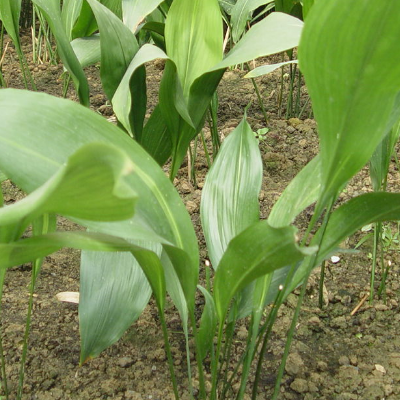Matters needing attention in introduction of Gastrodia elata
Gastrodia elata is a very traditional Chinese medicine in China, which has a very extensive planting area in our country. And Gastrodia elata has no roots and leaves, so it is difficult to get nutrients. Therefore, when planting Gastrodia elata, it is mainly introduced and cultivated, and there are a lot of things we need to pay attention to because of the particularity of Gastrodia elata. So the editor today brings you some points for attention in the introduction of Gastrodia elata. Let's take a look at it.

1. Suitable environment
As I just said, Gastrodia elata is a rootless and leafless crop, and photosynthesis cannot be carried out without leaves. Therefore, in the growth of Armillaria mellea mainly through the intake of vegetative growth, so we should first cultivate Armillaria mellea before introduction. Gastrodia elata is suitable for growing in the planting plots where the previous crops are potatoes and other crops, and it is relatively simple to manage. However, we need to control the temperature at about 15-25 degrees, the best growth temperature is about 22 degrees, the field humidity should be kept at about 80%, and the soil moisture is about 52%. Choose acid soil.
2. Introduction time
As Gastrodia elata is more suitable to grow in a cool environment, it is best to choose in spring and autumn when introducing. The temperature of these two seasons is more suitable for the growth of Gastrodia elata, but it is also necessary to determine a specific time according to the planting area. For example, in the north, it is generally better to be cultivated around January to March every spring. The introduction time is very important for the growth of Gastrodia elata. If the time is not suitable, it will reduce the yield and quality of Gastrodia elata. Heavy will lead to poor growth of Gastrodia elata and all die, so we should pay more attention to it.
3. Cultivate Armillaria mellea
As I just said, the growth and nutrient intake of Gastrodia elata are mainly obtained by Armillaria mellea. Therefore, I also need to cultivate a robust Armillaria mellea before introducing Gastrodia elata. High-quality test-tube mother species of Armillaria mellea are usually purchased three months before introduction and then cultivated into planting materials. The main purpose is to cultivate the mother species of Armillaria mellea into a culture medium, which will be introduced and planted after successful cultivation. Or if you buy the mother seed within a month, the time it takes to grow into bacterial material will be greatly reduced, and the technical difficulty of cultivation will also be reduced.
4. Field management
Although the nutritional demand of Gastrodia elata is not high and the management is relatively extensive, it is only for nutrition. In the successful introduction, the surrounding environment should be kept moist, and the water content of the soil should be kept at about 50%. If you encounter a long period of dry weather, then also timely watering to avoid Gastrodia elata lack of water drought, but water should not be too much, too much time to pay attention to drainage to prevent miscellaneous bacteria infection. And we should also pay attention to the prevention and control of pests such as rats and ants. Shading management should also be done in summer, and the temperature should not exceed 27 degrees.
Finally, after introduction, fill the gap of the fungus material with the sterilized soil, carry on the comprehensive disinfection to the fungus material, avoid infecting Gastrodia elata. When termites and other pests are encountered, they should be hunted and killed in time and can be eliminated with substances such as lime powder. That's all for today's introduction. This article is for reference only. Thank you for your reading and support.
- Prev

Planting conditions of Bletilla striata
Planting conditions of Bletilla striata
- Next

How do you reproduce an orchid? what's the price?
A leaf orchid, this is a lot of people like breeding, good-looking, high-looking is so likeable, how to breed one leaf orchid? One leaf orchid price is how much: one leaf orchid how to reproduce: one leaf orchid is an evergreen plant, the leaf is tall and straight, neat, and the leaf color is thick green bright, light and elegant and elegant. In addition
Related
- Fuxing push coffee new agricultural production and marketing class: lack of small-scale processing plants
- Jujube rice field leisure farm deep ploughing Yilan for five years to create a space for organic food and play
- Nongyu Farm-A trial of organic papaya for brave women with advanced technology
- Four points for attention in the prevention and control of diseases and insect pests of edible fungi
- How to add nutrient solution to Edible Fungi
- Is there any good way to control edible fungus mites?
- Open Inoculation Technology of Edible Fungi
- Is there any clever way to use fertilizer for edible fungus in winter?
- What agents are used to kill the pathogens of edible fungi in the mushroom shed?
- Rapid drying of Edible Fungi

